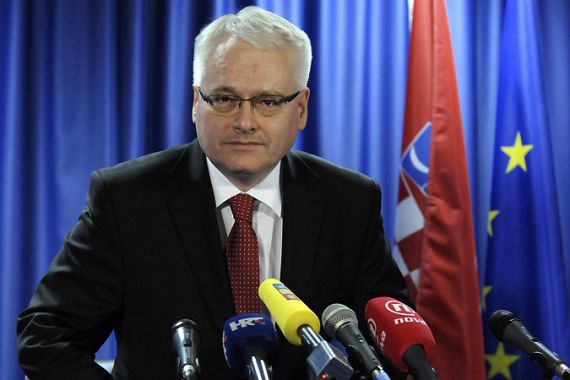Q&A: Croatian President Ivo Josipovic
Al Jazeera speaks to Croatian President Ivo Josipovic as his country formally enters the European Union.

Doha, Qatar – The European Union has just welcomed its 28th member. After 10 years of waiting for the coveted membership, Croatia has become the second former Yugoslavian country in the economic and political bloc.
The EU’s demographics will also change, even if only slightly, as 4.4 million additional citizens are included, while the bloc’s borders have expanded to reach the borders of Serbia, Bosnia and Herzegovina and Montenegro.
This is the EU’s sixth expansion, and the first in six years. Bulgaria and Romania were permitted entry to the club in 2007.
For Croatia, which became independent in 1991, EU membership brings an affirmation of national identity. Many in the Balkan country feel admission to the EU is recognition that they have left behind a past of war and ethnic conflict, and are venturing into a new era, hopefully one of peace and economic prosperity.
However, with unemployment in Croatia soaring to 18 percent, and the EU’s own economic malaise, challenges are, of course, not in short supply.
Al Jazeera’s Alma Brnicanin spoke with Ivo Josipovic, the president of the Republic of Croatia, just before the official accession. He reflected on the meaning of EU membership, a past burdened with conflict, and the prospects of peace and economic growth ahead.
Alma Brnicanin: What’s the biggest benefit that Croatia will receive from European Union membership?
Ivo Josipovic: When, on July 1, Croatia formally becomes a full member of the EU, its citizens will enjoy a high standard of protection, rights and opportunities that the EU gives to all its citizens. Maybe I would have to point out one aspect that I consider particularly important – when we remember that, 20 years ago, war was imposed upon Croatia.
For us, the European Union is first and foremost a peace project, and we do not forget that the original idea of European integration was to achieve lasting peace and good neighbourly relations. For us, who have recently been at war, this peacemaking aspect of EU is very important.
AB: How do you deal with the concerns about the potential economic collapse of the EU?
IJ: I believe that the economic crisis in the EU wasn’t predominantly generated by the EU, but by some members which, with their irresponsible policies, have led countries into an economic and financial crisis.
Sometimes I wonder how some EU member states affected by the crisis would pull through if there were no EU assistance.
We are aware that joining the EU does not mean that tomorrow begins a better life, but that membership brings new opportunities for us to take advantage of. Likewise, we should not forget that the Croatian accession to the EU is a positive sign to potential investors – and, at this point, Croatia needs investment to stimulate economic growth.
AB: What was the most important change for Croatia and its society during the accession reforms?
IJ: During the process of negotiation, Croatia [greatly] benefited. By implementation of reforms, Croatia strengthened its democracy, raised the level of protecting human rights, made its institutions strong enough to defend the rule of law, and any serious fight against corruption.
At the end of a long negotiation process, we can say that Croatia is now a better society than it was ten years ago.
AB: As Croatia is leaving the Central European Free Trade Association, how will joining the EU affect relations with your neighbour countries of the former Yugoslavia?
IJ: We knew that, by joining the EU, Croatia must leave CEFTA. Companies had time to prepare for it, and many Croatian companies are prepared for this change.
At the same time, entry into the EU market offers great opportunities, and I believe that Croatian business owners will take advantage of this opportunity. And let’s not forget, with Croatia joining the EU, [both] become more attractive for investors.
Follow Alma Brnicanin on Twitter: @AlmaBrnicanin